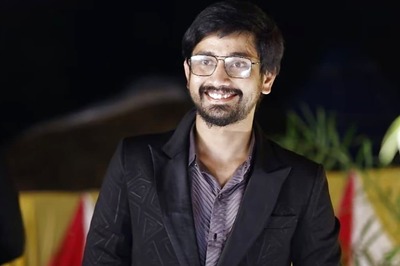
views
Washington: A Guantanamo Bay military judge sentenced a US general to three weeks' confinement after finding him in contempt of court Wednesday, the latest setback to hit the base's much-criticized military tribunals.
The unprecedented action at Guantanamo's military commissions coincidentally came the same day President Donald Trump said he was considering sending the suspect in Tuesday's New York attack to the notorious detention center.
The confinement of Brigadier General John Baker, who heads up the defence at Guantanamo, stems from the case against Abd al-Rahim al-Nashiri, the accused mastermind of the attack on the USS Cole in 2000.
Baker had agreed to let Nashiri's civilian defence team quit the case over a series of ethical conflicts and a lack of confidence that their privileged conversations were in fact confidential.
But military judge Air Force Colonel Vance Spath said they could not quit so ordered them to appear in person at the base or via video conference, the Miami Herald reported.
When Baker refused to return the team to the case or to testify, Spath found him in contempt.
Spath sentenced Baker to 21 days confinement to his quarters and ordered him to pay a $1,000 fine.
"The judge has the obligation and power to enforce decorum in the courtroom," military hearings spokesman Major Ben Sakrisson told AFP.
Citing a military rule, he added: "The military judge is responsible for ensuring that military commission proceedings are conducted in a fair and orderly manner, without unnecessary delay or waste of time or resources."
Harvey Rishikof, who is a civilian lawyer and the so-called convening authority in the case, must still approve the sentence.
Baker, who has been in the Marine Corps for nearly three decades, did not immediately respond to a request for comment.
'Bad dudes'
The military commissions at Guantanamo were started as a way to try non-US citizen "enemy combatants" captured in Afghanistan and elsewhere in the aftermath of the US-led invasion in 2001.
At the height of its operations after the September 11, 2001, attacks, the prison held 780 people detained mostly for their alleged ties to Al-Qaeda and the Taliban.
Since then hundreds have been transferred back to their home countries or other places, and the inmate population currently stands at 41, many of them stuck in legal limbo.
Barack Obama tried throughout his presidency to shutter the jail but was rebuffed by Republican opponents. As a candidate, Trump said he wanted to fill it with "bad dudes."
Critics assail the war courts for offering only an approximation of due process, with detainees given fewer legal rights than they would if they were tried in federal court.
Attorney David Nevin, who represents alleged 9/11 mastermind Khalid Sheikh Mohammed, said the latest breakdown in the process that has dragged on for years highlights inadequacies of trying people in a military commission instead of through the federal system.
"Putting people in jail for doing their jobs is just exactly what you would expect as a step in the military commissions," Nevins told AFP.
"It illustrates the proposition that military commissions are not a genuine criminal justice system."
Trump said Wednesday he may send New York terror suspect Sayfullo Saipov to Guantanamo.
"Send him to Gitmo, I would certainly consider that," Trump told reporters, using the nickname for the jail site.
The White House later said it sees Saipov as an "enemy combatant," potentially opening the door to his detention without normal rights.
Amnesty International human rights director Daphne Eviatar told AFP that "the chaos of the al-Nashiri case is yet one more sign of what a tragic mistake it would be to send someone else to Guantanamo."
"That is not the place to hold suspects accountable for crimes," she said.
Saipov is a holder of a US permanent residency card. Experts could not recall if there had ever been a case of another "Green Card" holder being shipped to Guantanamo.
"Fifteen years has proven no one will ever be successfully tried or 'brought to justice' at Guantanamo, and the president and his supporters within his own party are deluded if they believe otherwise," said the Center for Constitutional Rights, which has represented Guantanamo detainees.



















Comments
0 comment